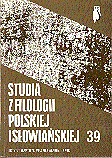Schemat wyobrażeniowy ŚCIEŻKA-CEL w językach polskim, rosyjskim, bułgarskim i słoweńskim
Imagery of the path-goal schema
in Polish, Russian, Bulgarian and Slovenian
Author(s): Zofia Kaleta, Teresa Żeberek, Iwona Nowakowska-Kempna, Agnieszka Będkowska-KopczykSubject(s): Language and Literature Studies
Published by: Instytut Slawistyki Polskiej Akademii Nauk
Summary/Abstract: In Slavic languages the same scenes of the path-goal schema are often coded by different cases, prepositions and sometimes verbal prefixes. The differences have not been explained up to now. We want to show that this can best be done within the cognitive linguistic framework (Langacker 1987). We focus on the analysis of a few instantiations of the schema that refers to physical movement in certain settings, and on the grammatical cases that code the categories 'goal' and 'path' in combination with prepositions and directional verbal prefixes in Polish, Russian, Bulgarian and Slovenian. We argue that the different linguistic coding reflects alternate images of the scenes in the above-mentioned languages. Especially crucial are: the varying salience of certain features of a goal, such as its shape as well as the varying level of abstractness at which the scene is treated. We will demonstrate that the most similar imagery reflected in the linguistic coding occurs in scenes denoting motion to the goal perceived as a surface in the four languages. The imagery of other scenes shows differences. We argue that some iconicity can be seen in the coding of certain scenes. Finally, we want to show that despite differences in imagery the schema path-goal constitutes in Slavic languages a hierarchical semantic structure that represents a radial category. The prototypical spatial meaning is extended to more marginal spatial meanings through one of the conceptual mechanisms of generalization, specialization, and metonymy.
Journal: Studia z Filologii Polskiej i Słowiańskiej
- Issue Year: 2004
- Issue No: 39
- Page Range: 197-217
- Page Count: 21
- Language: Polish

